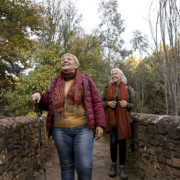Unlock the Secrets of a Sharp Mind: Your Ultimate Guide to Alzheimer’s Prevention
As we age, the fear of losing our mental abilities to Alzheimer’s disease becomes increasingly worrisome. With no known cure, prevention is our best defense. But how exactly can we safeguard our minds from this devastating condition? Is it possible to unlock the secrets of a sharp mind and prevent the onset of Alzheimer’s? In this ultimate guide to Alzheimer’s prevention, we explore the latest research and expert advice to help you understand the key factors that contribute to brain health and how you can take control of your cognitive well-being.
The Power of a Healthy Lifestyle
Living a healthy lifestyle has numerous benefits, and it’s no different when it comes to preventing Alzheimer’s disease. Scientific studies have shown that regular exercise, a nutritious diet, and sufficient sleep can significantly reduce the risk of cognitive decline. Engaging in physical activities, such as walking or jogging, not only improves cardiovascular health but also promotes the growth of new brain cells and strengthens connections between neurons. Additionally, consuming a diet rich in fruits, vegetables, whole grains, and lean protein provides essential nutrients that support brain function. And never underestimate the power of a good night’s sleep; it allows your brain to recharge and process information, enhancing memory and cognitive performance.
The Social Connection
In this era of increasing online interactions, it’s easy to overlook the importance of real-life social connections. However, research has consistently shown that maintaining strong social ties is vital for brain health. Social engagement, such as participating in community activities, joining clubs, or simply spending quality time with loved ones, helps stimulate cognitive abilities and lowers the risk of Alzheimer’s disease. Interacting with others stimulates the brain, challenges memory recall, and boosts overall mental well-being. So, make an effort to prioritize socialization and foster meaningful relationships to keep your mind sharp.
Mental Stimulation Matters
Just like physical exercise strengthens your muscles, mental stimulation exercises your brain. Engaging in activities that challenge your cognitive abilities, such as solving puzzles, learning a new instrument, or studying a new language, can improve memory and enhance brain plasticity. Scientific evidence suggests that regularly challenging your mind through mentally stimulating activities builds up a reserve of cognitive function, making it more resilient to the effects of aging and potentially protecting against Alzheimer’s disease. So, don’t shy away from brain teasers or new learning opportunities; they could be your brain’s best friend.
Keeping Stress at Bay
Stress, the silent predator, wreaks havoc not only on our mental well-being but also on our brain health. Prolonged exposure to high levels of stress hormones can lead to inflammation and damage to brain cells, increasing the risk of cognitive decline. Therefore, finding effective ways to manage stress is crucial in Alzheimer’s prevention. Techniques such as meditation, deep breathing exercises, and practicing mindfulness have shown promising results in reducing stress levels and improving overall brain health. So, take a step back, breathe, and give your mind the relaxation it deserves.
A Lifelong Commitment
Preventing Alzheimer’s disease is not a quick-fix solution but a lifelong commitment to your brain health. It requires consistent effort and a holistic approach that encompasses all aspects of life. By adopting a healthy lifestyle, nurturing social connections, engaging in mentally stimulating activities, and managing stress, you can significantly reduce the risk of cognitive decline and enhance your overall mental well-being.
In the pursuit of unlocking the secrets of a sharp mind, remember that prevention is key. Although there are no guarantees, embracing these strategies offers the best chance of protecting your brain against Alzheimer’s disease. So, make the commitment today; your future self will thank you tomorrow.









